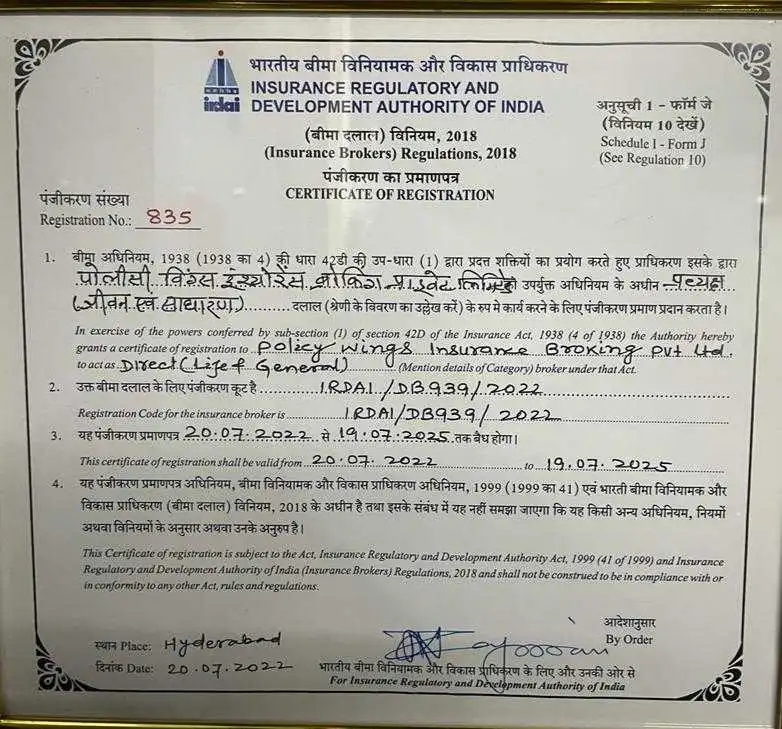Health Insurance vs Mediclaim
Easy Navigation
Health Insurance vs Mediclaim
The medical inflation rate in India stands at 14% for 2022. In other words, the cost of healthcare has gone up by 14% from the previous year. And this is a recurring trend, as medical inflation remains one of the steepest inflation rates. What does this mean for you? Merely relying on savings for any future medical needs might not be enough.
Buying a health insurance plan is one of the smartest ways to deal with the rising cost of healthcare in the country. If you are out in the market to buy protection against health hazards, there is a good possibility that you will come across Mediclaim or health insurance plans. But is there any difference between both plans and which one should you opt for? Here is all that you need to know about it.
What Is Mediclaim Insurance?
Mediclaim insurance is a specialised type of health insurance where the plan is designed to cover the expenses of hospitalisation only. It is a cost-effective way of covering hospital-related expenses. The only caveat is that the plan only covers hospitalisation expenses. The insured is responsible for paying for all other types of expenses.
What Is Health Insurance?
A health insurance plan offers more comprehensive coverage for all medical expenses. The plans are designed in a way to protect individuals and their families against a wide range of medical expenses that are common occurrences. These charges include hospitalisation charges, consultation fees for doctors, ambulance charges, the cost of diagnostic tests, etc.
Since the coverage on offer is a bit higher on a health insurance plan as compared to Mediclaim insurance, the premiums are also a bit higher. Also, insurance providers offer the option to include critical illness coverage.
What Is The Difference Between Mediclaim Insurance And Health Insurance?
A lot of policy buyers usually confuse Mediclaim insurance policies and health insurance plans. If you are confused between both policies, here are some differences that will help you better understand the plan.
| Mediclaim Insurance | Health Insurance Plan |
| The plan provides coverage only for hospitalisation-related expenses | The plan provides coverage for hospitalisation and a bunch of other expenses such as daycare, consultation fees, diagnostic tests, pre and post-hospitalisation expenses |
| Insurance providers usually offer coverage up to Rs. 5 lakhs, unless specified otherwise by an insurance provider | The coverage amount on offer is much more extensive since a lot of factors get into deciding the policy like pre-existing conditions, age, number of people covered, etc. |
| You cannot opt for add-ons or any additional cover with a Mediclaim policy | You can choose from a list of add-ons to further enhance the coverage of the policy. Some common add-ons include critical illness, infertility cover, etc. |
| The number of customisations possible on Mediclaim is limited | Insurance providers offer a lot of flexibility and customisations when it comes to health insurance plans |
| You can file for a claim at any time you want until the total sum insured is not exhausted | In a health insurance plan, you can also file as many claims as you want to, as long as your sum insured is intact. However, for certain types of health insurance policies like critical illness cover or accidental benefits, the sum insured which is paid as a lump sum amount, can be claimed only once. |
Things To Know Before Buying A Mediclaim/Health Insurance Plan In India
Buying protection of any type is essential for protecting yourself and your loved ones from rising costs. However, there are a few things that you ought to be aware of before you proceed to buy either a health insurance plan or a Mediclaim insurance. The following are some of these.
1. Sum insured
This is one of the most crucial aspects of any insurance plan. The sum insured is the maximum amount that you can claim for any medical expenses. It is important to look for a plan that offers an adequate sum insured.
2. Co-payment clause
Health plans might have a copayment clause. If your health plan has a co-payment clause, you will need to co-pay a certain percentage of the claim. For example, a 10% copayment would result in Rs. 10,000 out-of-pocket expenses for a claim for Rs. 1 lakh.
3. Renewal options
Look for policies that offer lifetime renewal options. Insurance companies usually offer discounts on renewal if you have not filed any claims during the year. The discount can help you reduce the policy premiums by a considerable margin.
4. Tax benefits
When you buy a health plan by paying premiums, you become eligible for tax deductions under Section 80D. The deductions can range between Rs. 25,000 to Rs. 1 lakh for a fiscal year.
5. Type of plan
Health insurance plans as well as Mediclaim insurance plans are available in a bunch of varieties. The primary classification is individual and family floaters. If you opt for an individual plan, only one person will be covered by the plan. As a family floater will ensure that your loved ones are also covered by the plan.
6. Factors affecting premiums
Insurance companies look at a bunch of factors before deciding on the policy premium. Factors such as age, location of residence for the insured, term of the policy, features and benefits, sum insured, etc. can impact the premiums.
Should You Buy A Mediclaim Policy Or Health Insurance In India?
Buying protection for health contingencies is crucial given the costs of treatment and the direction in which they are going. When you do decide to buy a policy, there are a couple of options to choose from. You can either opt for a Mediclaim policy or a Health insurance plan.
Both the plans offer cover for hospitalisation and tax benefits. But that is where the similarities end. If you are looking for a plan that offers hospitalisation cover and is quite affordable, a Mediclaim policy might suffice your needs. However, for people looking for more comprehensive coverage, a health insurance plan is highly recommended.
Benefits of Buying a Mediclaim Policy
When you choose to buy a Mediclaim Policy, the following are some of the major benefits that you can have.
1. Safeguard against the ever-increasing cost of hospitalisation
2. Ability to buy the policy online within a few minutes
3. You can buy a Mediclaim policy for the entire family
4. Should you visit a network hospital, the entire hospitalisation expenses can be cashless
5. You can avail of tax benefits on the premiums paid towards the policy
Inclusions of a Mediclaim Policy
The actual inclusion of a medical policy can vary depending on the insurance provider that you choose. However, the following are some standard inclusions of a Mediclaim policy.
1. Inpatient
Covers the expenses incurred by the policyholder for admission to a hospital for more than 24 hours.
2. No claim bonus
For each year that you do not file a claim for your Mediclaim plan, you will receive a no-claim bonus on policy renewal.
3. Domiciliary treatment
If the insured is treated at home due to a lack of hospital beds or due to the inability to transfer them to a hospital, a Mediclaim plan will cover those expenses.
4. Preventive health checkup
Insurance providers usually offer complementary preventive health checkups for their policyholders, on the completion of certain claim-free years.
Exclusions of a Mediclaim Policy
Being aware of the exclusions of a Mediclaim Policy will allow policyholders to avoid any unwanted claim rejections. The following are some of the major exclusions of a Mediclaim policy.
1. Self-inflicted injuries
2. Sexually transmitted diseases
3. Pregnancy-related expenses
4. Cosmetic surgeries
5. Treatment of infertility
6. Injuries or medical conditions due to the consumption of alcohol
Benefits of Buying a Health Insurance Policy
On deciding to buy a health insurance plan, you get access to the following benefits.
1. The plan offers protection against rising medical expenses and a lot of other healthcare expenses such as ambulance charges, daycare procedures, domiciliary charges, etc.
2. The premiums that you pay toward the policy allow you to take advantage of tax benefits u/s 80D of the Income Tax Act of 1961.
3. You can opt for riders such as critical illness cover, which can offer protection against life-threatening conditions such as heart attack, paralysis, kidney failure, organ transplant, etc.
4. A visit to a network hospital will ensure that you do not have to pay anything out of your pocket. Your insurance provider will directly settle the bill with the hospital, keeping you away from the hassle of making payments on discharge.
5. Quite a few companies and businesses offer group health insurance benefits for their employees and their dependents. However, the customisations on these plans are very restrictive.
Inclusions of a Health Insurance Plan
The following are some of the standard coverages on offer as far as a health insurance plan is concerned. The actual coverage on offer might differ based on your insurance provider.
1. Inpatient
The policy will cover all expenses that a patient incurs if they are admitted to a hospital for more than 24 hours. These charges usually include room rent, ICU charges, nursing charges, medicines, consultation fees, etc.
2. Daycare procedures
Certain procedures do not require the patient to be admitted for more than 24 hours, yet they can be a bit expensive. Procedures such as radiotherapy, dialysis and cataract surgeries are some examples of daycare procedures. A health insurance plan covers such procedures.
3. Pre and post-hospitalisation
A health insurance plan covers expenses up to 90 days prior to the admission to a hospital and up to 180 days post-hospitalisation. These expenses can be related to consultations, medicines, diagnostic tests, follow-up visits, etc. This coverage can help you save a considerable amount of time, which can otherwise go unnoticed.
4. Domiciliary expenses
In the event that a patient cannot be taken to the hospital or there aren’t any beds available for admission, the treatment can take place at home. A health insurance plan usually covers these domiciliary expenses.
5. Pre-existing conditions
Health insurance plans usually cover some of the pre-existing conditions, albeit a waiting period. On the completion of the waiting period, the policy will cover expenses for the pre-existing conditions as well. However, it is important that you declare any pre-existing conditions to the insurance provider, to ensure that there aren’t any claim rejections.
6. Alternative treatment
Insurance companies generally cover alternative treatments such as AYUSH. AYUSH stands for Ayurveda, Yoga & Naturopathy, Unani, Siddha and Homeopathy. To claim expenses related to AYUSH treatment, the insured must be admitted for the treatment. Also, the treatment must be carried out in government hospitals or institutes. Or the ones recognised by the Quality Council of India or the National Accreditation Board for Hospitals & Healthcare.
7. Maternity benefits
Most health insurance policies in India cover the expenses related to maternity. Some of the policies require the policyholders to undergo a waiting period before it can be covered. However, given the ever-rising costs of healthcare, having maternity benefits can be quite beneficial.
Exclusions of a Health Insurance Plan
The following are some of the exclusions of a health insurance plan. Filing a claim for the below might lead to claim rejections.
1. Cosmetic surgeries
2. The cost of health supplements
3. Expenses pertaining to alternative therapy
4. The cost of diagnostic tests, that do not lead to hospitalisation
5. Self-inflicted injuries
6. Injuries or medical expenses due to the consumption of alcohol
7. Treatment of infertility
Things That Make Health Insurance Different From Mediclaim
Understanding the primary differences between both plans is the first step to choosing a better plan for your needs. Now that we know some of the basic differences between a Mediclaim and a health insurance plan, here are some offerings of a health insurance plan that make it stand out from a Mediclaim plan.
1. Pre and post-hospitalisation charges
Anyone who has been hospitalised understands that the cost of treatment is not limited to just hospitalisation. There can be some expenses prior to the admission of a patient to the hospital and a lot of expenses that can come into the picture on discharge. This is where a health insurance plan aces a Mediclaim policy. Before the insured is admitted to the hospital, there can be expenses such as You can file for expenses that are related to pre and post-hospitalisation and save money on them, which is not possible in a Mediclaim plan.
2. Claims
A Mediclaim policy allows its subscribers to file as many claims in a year as they want to, as long as the sum insured of the policy is not exhausted. On the other hand, a health insurance plan usually allows policyholders to file one claim per calendar year.
3. Ambulance
At the time of an emergency, getting into an ambulance can be one of the easiest ways to reach a hospital. Considering that ambulance charges can be a lot depending on your location and the location of the hospital, getting a cover can be beneficial. However, Mediclaim policies do not allow such types of claims. But insurance policies usually offer that as a benefit.
4. Daycare procedures
The scope of a Mediclaim policy is limited to the expenses pertaining to a hospital admission. Thus, it naturally eliminates the need to cover any daycare procedures. However, you can receive coverage for such procedures with the help of a health insurance plan. Medical procedures such as dialysis, radiotherapy, cataract surgery etc. are some examples of day care procedures.
Similarly, Mediclaim policies do not cover the expenses related to maternity, irrespective of whether it is a normal delivery or a Caesarean delivery. If you want the benefits of maternity coverage, a health insurance plan is what you should be looking to buy.
5. Coverage and premiums
Mediclaim insurance policies offer limited coverage of hospitalisation only. This allows insurance providers to offer the policy at much more affordable premiums. A health insurance plan, on the other hand, can have a wide range of coverage on offer. Also, it allows the policy buyers to purchase a policy that meets their needs and at a premium that they can afford.
6. Flexibility
Mediclaim policies usually are set plans, thereby not allowing for a lot of scope of changes. On the contrary, health insurance plans allow policy buyers to change a lot of factors to make a policy cater to their needs. For example, you can change the terms of the plan, the premium amount that you want to pay, the features on offer as well and the coverage with the help of add-ons. Therefore, making way for a great deal of flexibility.
Conclusion
Mediclaim insurance plans can offer basic hospitalisation coverage at an affordable price point. A health insurance plan, on the other hand, offers better coverage albeit a higher policy premium. Depending on your needs and requirements, you can use the above information for either of the policies.
Frequently Asked Questions (FAQs)
Most insurance companies offer health plans for individuals between the ages of 18 years and 65 years.
Most health insurance companies offer coverage pan India unless the policy document says otherwise.
It would come down to individual preference, however, it is recommended to opt for a health insurance plan, since it offers much better coverage.
Leading Health Insurance Companies




























